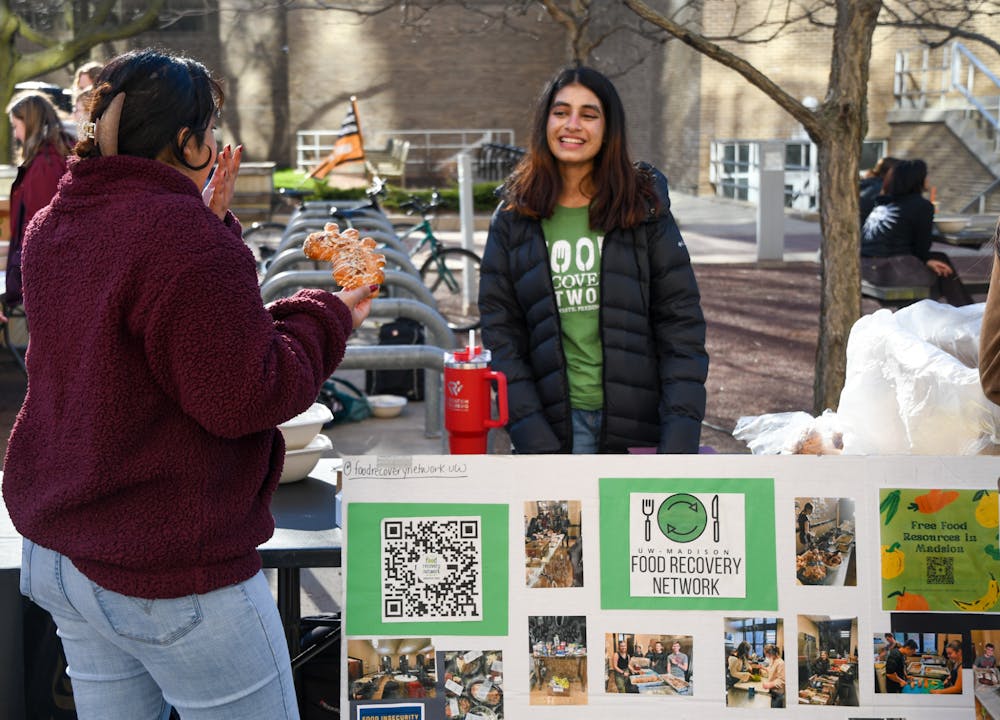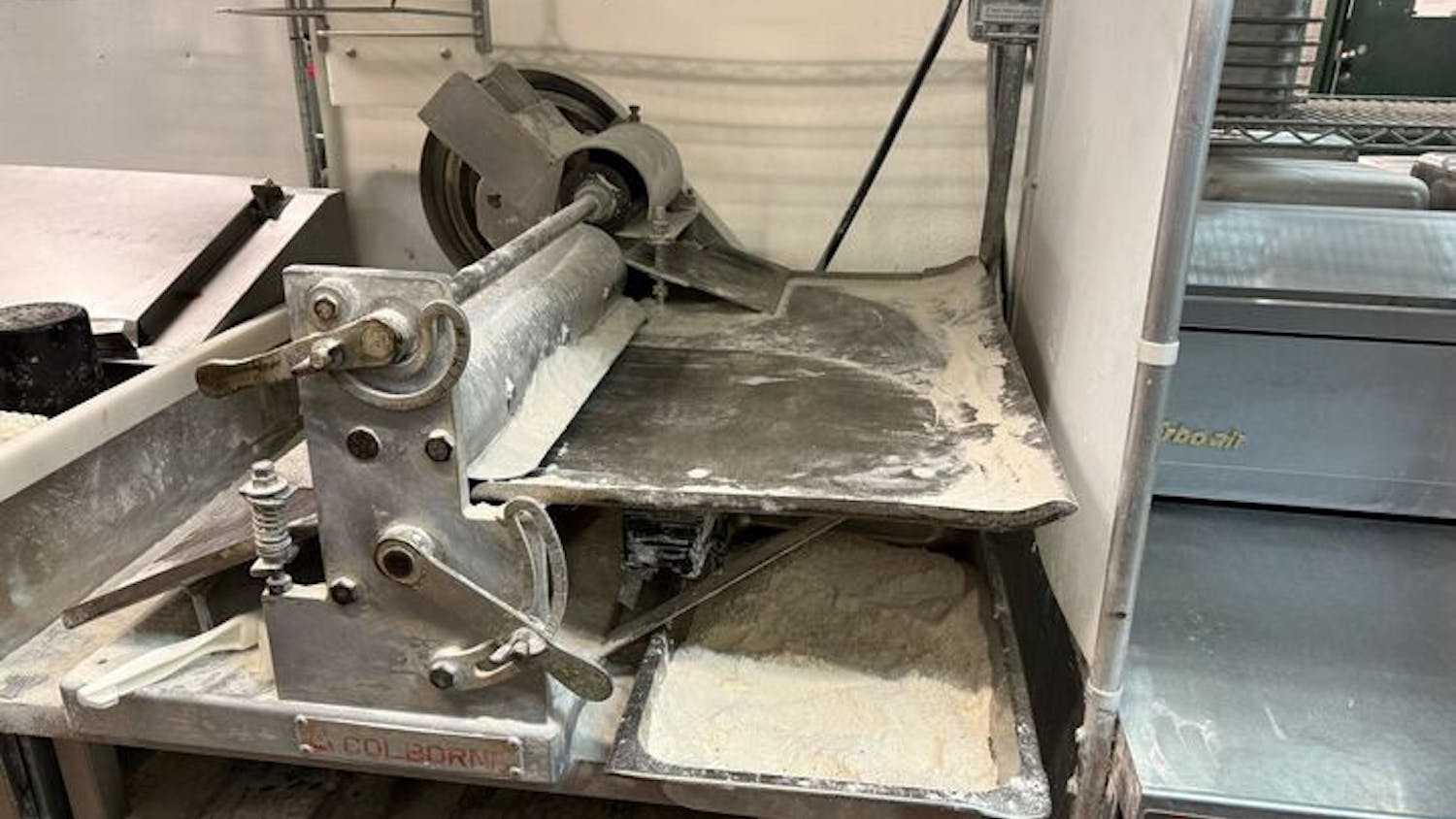“What does sustainability mean to you?” a whiteboard made by the leaders of Associated Students of Madison’s Sustainability Committee asked attendees at an April 5 “March Forth to Earth Day” event on East Campus Mall.
“Everything you make returns as food or poison,” one person wrote.
“Equitable access to green spaces,” another person put down.
“Food justice for all,” another wrote.
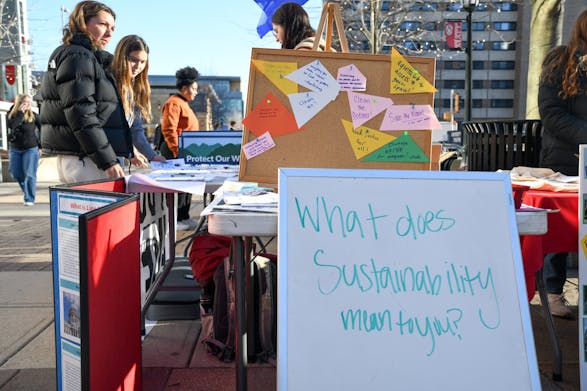
Patrons stuck those quotes on a corkboard made from reused Associated Students of Madison (ASM) office supplies. The event was the first of four leading up to an April 20 climate-focused march to the Capitol, according to organizers.
Attendees explored booths and listened to environmental speakers while enjoying free to-go food, Panera pastries, bagels provided by the Food Recovery Network and homegrown produce from The People’s Farm.
Through the events, which will occur every Friday from 4 p.m. to 6 p.m. until Earth Day on April 22, sustainability activists want to raise statewide awareness on environmental issues, according to ASM Sustainability Logistics Coordinator Winston Thompson.
Food justice was a theme of the event, organizers said. ASM Sustainability Chair Christina Treacy said living with a grandfather who was an organic farmer in South Dakota meant never wasting. That’s a value she brought into adulthood.
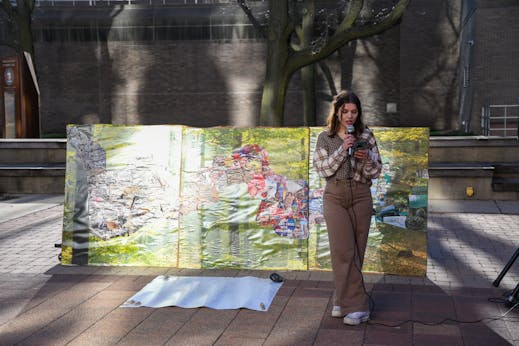
“When I think of food sustainability, I think of reconnecting with those roots,” she said. “It's about food justice, which means universal access to nutritious, affordable and culturally appropriate food.”
Education and enjoyment
UW-Madison has a rich history of climate activism. Former Wisconsin Gov. and U.S. Sen. Gaylord Nelson, namesake of the Nelson Institute for Environmental Studies, created Earth Day in 1970.
On the first Earth Day on April 22, 1970, Madison celebrated with an environmental art show, a film festival and dozens of workshops on problems like cancer-causing food additives, pollution and land use problems.
More than a half century later, ASM Sustainability Chair Ashley Cheung spearheaded the creation of March Forth to Earth Day in 2022. Thompson said the event originally focused on the pipeline and divestment movement.
ASM Sustainability has wanted to keep the 2022 march’s legacy alive since then, Thompson said.
“We've incorporated more student organizations to give people a chance to connect, talk, give some speeches and really build momentum for Earth Day, which is a really big part of UW Madison and UW Madison's history,” Thompson said.
People may have been drawn by the food and positive energy, but some learned something on the way.
“I heard the music, and it’s bumping,” UW-Madison freshman Jaden Ohs said. Though he started by “grabbing vegetables,” he said he learned “it's really important for these vegetables to be grown locally sourced and non-GMO because they can affect our environment.”
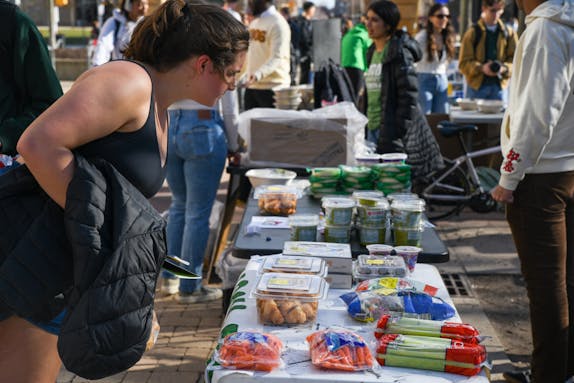
UW-Madison sophomore Ava Glaser said attending events like this will impact people later in life.
“Being able to prove that people show up for this and that they're here no matter what is the first step to create that ripple effect,” Glaser said.
Student activists said they felt the event made a positive impact to raise community awareness.
“We're definitely building momentum,” Treacy said. “Today was about getting the word out and showing people who we are and what we're doing, and I'm really excited to see where we're going with these.”
Diverse array of organizations attend event
Including diverse student organizations in the events widens the range of issues covered and encourages communication between groups, Thompson said.
Amanjot Kaur, president of the Student Voters Union, said the upcoming presidential election and state Senate and Assembly races will be impactful for environmental, climate and social justice issues.
“I want all you guys to vote on election day in November,” Kaur said. “I don't care who you vote for, I just think it's super important that you share your voice.”
An opportunity for political engagement also came from the Tar Sands Team, a cooperation between climate group 350 Wisconsin and the Sierra Club of Wisconsin. The group hopes to shut down Enbridge Line 5, a 645-mile oil pipeline spanning from Wisconsin to Canada.
“Everybody who I talk to is always very receptive,” Tar Sands member Alex Goetsch said. “They’re very like ‘I didn’t know’ and see how it's an important issue.”
We Outside, a new student organization focusing on increasing the presence of Black, Indigenous and other people of color in outdoor recreation, had a table and poster at the event.
We Outside board member Kyla Smith said the group aims to “decrease as many barriers as possible,” whether students are held back by finances or a lack of safe spaces.
“We want to get the word out about our organization since we are very new,” Smith said. “We have some really cool events, very community oriented, very outdoorsy, so we wanted to be part of this space.”
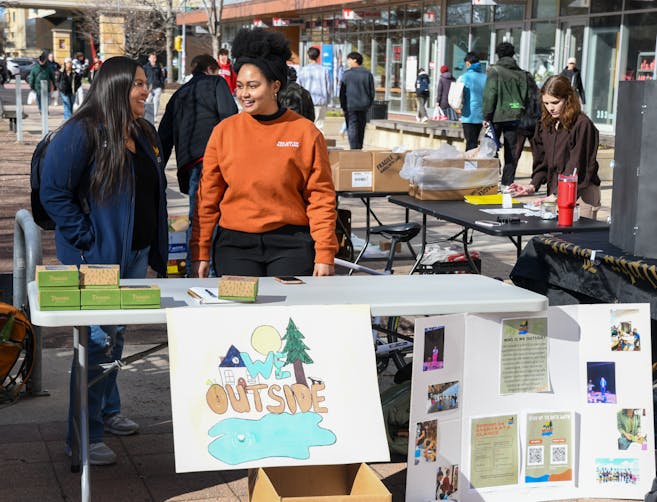
The Gamma Epsilon chapter of UW-Madison’s Alpha Phi Alpha fraternity, the oldest intercollegiate African American fraternity, joined the event to “talk about sustainability and help promote it,” said Olakunle Ojo, a member of Alpha Phi Alpha.
Ojo said combating community support and food insecurity goes alongside Alpha Phi Alpha’s vision of service and advocacy. The organization focuses on community support and food insecurity.
And People’s Farm, a student organization which provides educational experiences through farm workdays at their acre-and-a-half plot in the Eagle Heights Community Gardens, brought fresh vegetables and fruit for attendees to enjoy.
“When people learn something, that's like my favorite thing,” People’s Farm Director Connor Reilly said. “Like, ‘What is this plant?’ And it's something I'm very familiar with, but they might not be. It's super gratifying to be able to spread knowledge throughout the community.”
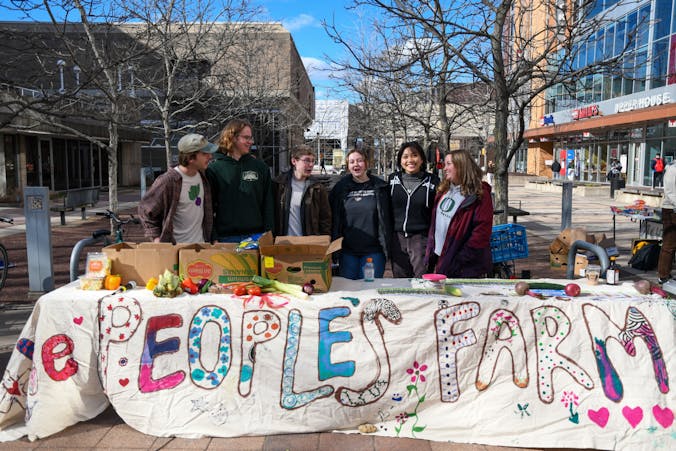
Mary Bosch is the college news editor and photo editor emeritus for The Daily Cardinal. She is a second year journalism and sociology student with a focus in data. Follow her on twitter: @Mary_Bosch6

